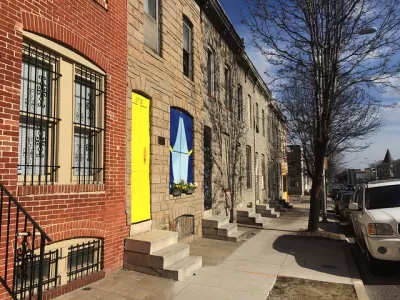In an overwhelmingly white industry, Black developers find it harder to access investment, equity, and opportunities.

In the wake of last year's Black Lives Matter protests and America's nationwide reckoning on race, Black developers are calling for a similar awakening in the real estate industry. Writing in the Washington Post, Amanda Abrams reports on the lack of diversity among developers and how that has led to "real estate projects overwhelmingly targeted to middle- and upper-income groups."
"Statistics for developers are difficult to come by, but Urban Land Institute (ULI), a national real estate and land use industry association, says 5 percent of its members identify as Black or African American." In a series of Washington Post inquiries, Black developers agreed that "their opportunities have been limited by racism, institutional bias and a lack of connection to powerful networks." This makes it harder for Black-led firms to get loans for their projects, says Diarra McKinney of Rosewood Strategies, a D.C. development firm. When the loans do come through, "the terms are not the same; the interest rate will be much higher. And you don’t know why that is. It’s all behind the scenes."
"Developers also need equity, in the form of investments from friends, family or private firms, to close their deals. And that can be even harder for Black developers to procure than bank credit. The asset management industry, which includes institutional investors and private equity groups, is overwhelmingly White. And family and friends, even well-off ones, simply may not have the extra funds to invest in a real estate project."
The inequity in development, says Curtis Doucette, managing partner of Iris Development, is "a function of the wealth disparities in this country." With less net worth in the Black community as a whole, it becomes more difficult to secure investment and get projects off the ground.
Some Black developers operate in the affordable housing space, where returns are lower and "the deals are perceived as more of a hassle to finance and manage." Adeola Adejobi, who runs the Diversity in Commercial Real Estate Conference, says minority developers who "grew up in those communities" bring a different, more people-centered perspective. For developers like Bree Jones of Parity Homes, equity is essential. Jones is working on redeveloping 96 rowhouses in west Baltimore, to be sold at affordable rates to local families. She hopes projects like hers can bring "development without displacement" to communities that need it. The question for many is whether the recent interest in supporting Black developers and Black-led firms will create lasting momentum and change.
FULL STORY: Black developers call for reckoning in real estate

Alabama: Trump Terminates Settlements for Black Communities Harmed By Raw Sewage
Trump deemed the landmark civil rights agreement “illegal DEI and environmental justice policy.”

Planetizen Federal Action Tracker
A weekly monitor of how Trump’s orders and actions are impacting planners and planning in America.

Why Should We Subsidize Public Transportation?
Many public transit agencies face financial stress due to rising costs, declining fare revenue, and declining subsidies. Transit advocates must provide a strong business case for increasing public transit funding.

Understanding Road Diets
An explainer from Momentum highlights the advantages of reducing vehicle lanes in favor of more bike, transit, and pedestrian infrastructure.

New California Law Regulates Warehouse Pollution
A new law tightens building and emissions regulations for large distribution warehouses to mitigate air pollution and traffic in surrounding communities.

Phoenix Announces Opening Date for Light Rail Extension
The South Central extension will connect South Phoenix to downtown and other major hubs starting on June 7.
Urban Design for Planners 1: Software Tools
This six-course series explores essential urban design concepts using open source software and equips planners with the tools they need to participate fully in the urban design process.
Planning for Universal Design
Learn the tools for implementing Universal Design in planning regulations.
Caltrans
Smith Gee Studio
Institute for Housing and Urban Development Studies (IHS)
City of Grandview
Harvard GSD Executive Education
Toledo-Lucas County Plan Commissions
Salt Lake City
NYU Wagner Graduate School of Public Service




























